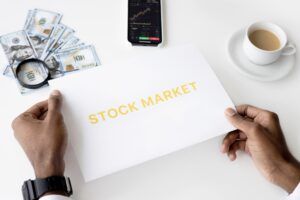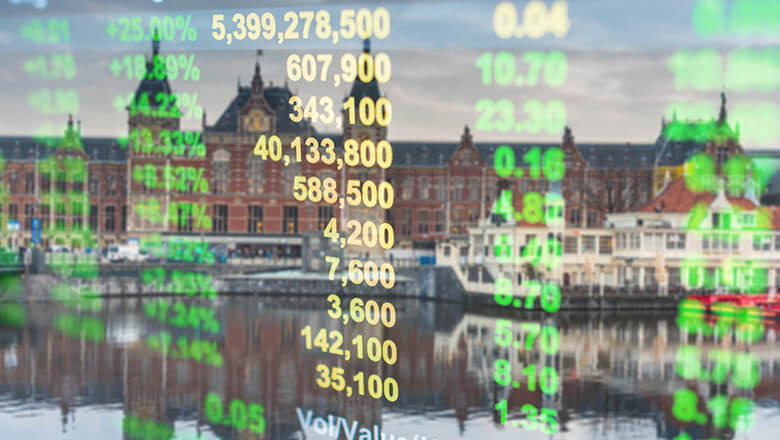Why Does the Stock Market Exist
The securities exchange exists for a few key reasons, every one of which adds to the working of present-day economies:
Capital Raising for Organizations
Organizations can raise capital for extension and improvement by giving offers to the general society. This is normally finished through a first stock sale (Initial public offering) or resulting public contributions.
By selling proprietorship stakes (value), organizations can acquire the assets required for development without assuming obligation.
Speculation Amazing open doors for People and Foundations
The securities exchange gives a stage to financial backers to buy partakes in organizations, offering potential open doors for abundance development through profits and capital appreciation.
It considers broadened speculation portfolios, and diminishing gamble through shifted resource assignment.
Liquidity
The financial exchange offers a system for financial backers to trade shares without any problem. This liquidity makes putting resources into stocks more alluring because financial backers realize they can enter and leave positions moderately rapidly and at fair market costs.
Value Revelation
Through the communications of purchasers and merchants, the financial exchange decides the honest evaluation of an organization’s portions. This cost disclosure process is basic for effective capital assignment in the economy.
Financial Pointer
Financial exchanges frequently mirror the general soundness of the economy. Rising stock costs can demonstrate monetary development while falling costs might flag financial issues.
Policymakers and experts utilize securities exchange patterns to measure monetary execution and settle on informed choices.
Corporate Administration and Responsibility
Public corporations are dependent upon administrative necessities and investigation, which can prompt better corporate administration and straightforwardness.
Investors, as part-proprietors, can apply impact over organizations executives and strategies through casting a ballot rights and activism.

Financial Development
By working with the progression of capital from savers to organizations, the financial exchange upholds monetary turn of events and advancement.
It empowers organizations to put resources into exploration, improvement, and development, prompting position creation and financial advancement.
In outline, the securities exchange is a fundamental part of the monetary framework, empowering the proficient portion of assets, giving venture potential open doors, guaranteeing liquidity, and adding to financial development and dependability.
Monetary Pointer
The securities exchange’s presentation is much of the time thought about a check of an economy’s wellbeing. Rising stock costs are related to corporate productivity and financial development while declining costs signal issues ahead.
Speculation Valuable open doors
The securities exchange offers the opportunity to put resources into organizations and possibly grow a portfolio over the long run. The securities exchange has generally conveyed returns outperforming expansion, making it an essential device for retirement arranging, growing a substantial financial foundation, and monetary security. The financial exchange empowers financial backers to trade portions of organizations and different protections rapidly when required.
Raising Capital
In particular, the securities exchange offers a stage where organizations raise assets by giving stocks. This capital is fundamental for business extension, innovative work, and other corporate drives. By offering offers to general society, organizations get to these assets without causing obligation.
Asset Portion
By mirroring the aggregate judgment of merchants and financial backers through the cost of various organizations, the securities exchange is said to help effectively circulate money to organizations bound.
Why Is the Financial Exchange So Significant?
Now that we know the various pieces of the financial exchange who, what, where, and how it works — we can more readily comprehend the reason why today’s an enormous piece of our economy.
At the point when the earliest financial exchanges were framed, the worldwide economy was immeasurably unique. These were times when exchange and business were determined by actual products, with enterprises like agribusiness, materials, and early assembling ruling the monetary scene. Securities exchanges at the time were youngster foundations, basically assisting with funding undertakings and exchange adventures, or, in other words, the pilgrim ventures taking merchandise and people groups from South Asia, the Americas, and Africa. These stock trades were at that point worldwide speculation activities.
Quick forward to now, and the securities exchange is viewed as fundamental to the worldwide economy, a change highlighted by financialization and the rising predominance of monetary business sectors and establishments. This isn’t because more than 1,000,000 Americans work in finance.
Current economies are portrayed by a complicated snare of monetary exchanges and instruments, with the financial exchange a gauge for monetary well-being as well as considered to be basic for circulating and making riches.
What’s the Distinction Between the Security Market and the Financial Exchange?
Around the world, the security market is bigger than the financial exchange, with about $130 trillion in securities remarkable and about $101 trillion in securities exchange capitalization, as per the last information accessible.
The security and financial exchanges fill various needs and proposition different gamble reward profiles for financial backers. In the security market, financial backers trade obligation protections, commonly given by legislatures (neighborhood, state, and government) or partnerships. At the point when you put resources into securities, you’re loaning cash for standard premium installments and the profit from the bond’s assumed worth at development.
The securities exchange includes trading offers and subsidiaries (instruments whose worth associates somehow or another to specific supplies) of public corporations. Putting resources into stocks implies purchasing a piece of proprietorship in an organization. Stocks offer the potential for more significant yields than securities since financial backers can get the two profits when the organization is productive and returns when the stock cost goes up. They likewise have a higher gamble, as stock costs can be more unpredictable.

What Is an Other Exchanging Framework?
Elective exchanging frameworks are stages for matching enormous trade exchanges and are not directed like trades. Dull pools and numerous digital money trades are private trades or gatherings for protection and cash exchange and run inside confidential gatherings.
Who Assists a Financial backer With exchanging on the Financial exchange?
Stockbrokers go about as mediators between the stock trades and the financial backers by trading stocks. Portfolio administrators are experts who contribute portfolios, or assortments of protections, for clients. Venture financiers address organizations in various ways, for example, helping privately owned businesses that need to open up to the world utilizing an Initial public offering or making arrangements for consolidations and acquisitions.
The financial exchange gives a setting where organizations raise capital by selling portions of stock, or value, to financial backers. Stocks give investors casting ballot rights as well as a leftover case on corporate profit as capital increases and profits.
Individual and institutional monetary patrons get together on stock exchanges to exchange participation in a public market. Right when you buy a part of the stock on the protections trade, you are not getting it from the association; you are getting it from an ongoing financial backer.
You don’t sell your portions back to the organization; all things considered, you offer them to one more financial backer on the trade.
How Do Stocks Function?
A stock is a monetary instrument that addresses possession in an organization or partnership and a proportionate case on its resources and profit. Stocks are likewise called offers or value.
Claiming stock implies that an investor possesses a cut of the organization equivalent to the number of offers held as an extent of the organization’s all-out remarkable offers.
For instance, an individual or substance that claims 100,000 portions of an organization with 1,000,000 remarkable offers would have a 10% proprietorship stake in it.
What Is a Stock Trade?
Stock trades are auxiliary business sectors where existing investors can execute with likely purchasers. Partnerships recorded on securities exchanges don’t normally trade their portions yet may participate in stock. Buybacks or issuing new offers; notwithstanding, these exchanges happen beyond the structure of the trade.
Biggest Stock Trades
The principal securities exchanges showed up in Europe in the sixteenth and seventeenth. Hundreds of years, essentially in port urban communities or exchanging center points like Amsterdam. London.
In the late eighteenth hundred years, securities exchanges started showing up in the US. Remarkably the New York Stock Trade (NYSE), considered value offers to exchange. The NYSE was established in 1792 with the consent of the Buttonwood. Arrangement by 24 New York City stockbrokers and dealers. Before this official joining, dealers and merchants would meet informally under a buttonwood tree on Money Road to trade shares.
Financial exchange Files
Lists address collected costs of a few distinct stocks, and the development of a file is the net impact of the developments of every part. Significant securities exchange lists incorporate the Dow Jones Modern Normal (DJIA) and the S&P 500.
The DJIA is an expense-weighted record of 30 colossal American organizations. Because of its weighting plan and the way that it simply involves 30 stocks. It’s everything except a nice indication of how the protection trade is doing.
For what reason Does the Financial exchange Exist?
The financial exchange is one of the most powerful parts of the worldwide economy, molding abundance creation, speculation systems, and corporate development. To comprehend the reason why the securities exchange exists, we want to investigate its set of experiences, its capabilities, and the more extensive financial and social settings that prompted its turn of events. Generally, the financial exchange fills various needs: raising capital for organizations, giving venture amazing open doors to people, working with cost revelation, and adding to monetary development.
Starting points and Authentic Advancement of the Securities exchange
The financial exchange’s starting points can be traced back to the late Medieval times when shippers and merchants started to formalize frameworks for trading partakes in adventures. The earliest type of stock exchange can be connected to the Dutch East India Organization, laid out in 1602, which gave the main portions of stock that could be purchased by people. Amsterdam’s stock trade turned into the world’s most memorable proper market for protections, starting a trend for how organizations could raise capital through open speculation.
Raising Capital for Organizations
One of the essential reasons the securities exchange exists is to permit organizations to raise capital by selling possession stakes, or offers, to general society. At the point when organizations issue stock, they sell little bits of themselves in cash return, which they can use to finance innovative work, extend tasks, or oversee everyday costs.
Without the securities exchange, raising a lot of capital would be more troublesome and restricted to private arrangements or getting from banks. This immediate admittance to capital empowers organizations to become quicker and all the more productive. A huge piece of current corporate support comes from value raised through stock contributions. Besides, the capacity to exchange shares on a stock trade gives organizations admittance to a fluid market where proprietorship can be moved effectively, making it more interesting to financial backers.
Giving Venture Opens Doors to People
The financial exchange additionally exists to furnish people and establishments with speculation open doors. All things considered, just affluent people and huge organizations, similar to banks and blue-bloods, approached critical venture choices. Notwithstanding, with the advancement of public financial exchanges, normal residents acquired the capacity to put resources into organizations, accordingly partaking in the benefits and outcomes of large companies.
Putting resources into the financial exchange offers people the possibility to develop their abundance over the long haul. Rather than simply procuring decent pay from investment funds or securities, investors can profit from capital appreciation, where the worth of their stocks rises, and from profits, which are occasional installments made by beneficial organizations to investors. Over the long haul, stocks have generally given more significant yields contrasted with different kinds of ventures, for example, government securities or land.
For some individuals, the financial exchange fills in as an essential vehicle for retirement reserve funds. People put resources into stocks straightforwardly or through shared reserves, annuity plans, and retirement accounts, for example, 401(k)s in the US. This expansive admittance to speculation open doors has democratized establishing financial stability and permitted individuals from different pay levels to take part in monetary business sectors.
Working with Value Disclosure and Liquidity
One more significant capability of the securities exchange is cost disclosure. Stock trades unite purchasers and merchants, empowering them to arrange costs for shares. The stock cost out of nowhere mirrors the aggregate judgment of all members about an organization’s future possibilities, considering a wide assortment of elements, for example, productivity, development potential, industry patterns, and monetary circumstances.
This framework gives straightforwardness and productivity in deciding an organization’s worth. Financial backers approach constant data on stock costs, going with it simpler to settle on informed decisions. Without stock trades, there would be significantly less straightforwardness, and costs would be set in confidential arrangements, possibly making failures and uneven characters in data.
Also, the securities exchange gives liquidity, meaning financial backers can trade shares generally rapidly and without any problem. This liquidity is pivotal because it brings down the gamble for financial backers, making it more straightforward for them to enter or leave speculations. The simplicity of exchanging makes the financial exchange an alluring spot for both transient brokers hoping to gain by market changes and long-haul financial backers zeroing in on development.
Adding to Financial Development
The financial exchange assumes a critical part in advancing monetary development by diverting money to organizations and working with interest in development and foundation. At the point when organizations can raise capital through stock contributions, they can put resources into new activities, enlist workers, and extend their tasks, all of which add to monetary development. This interest thusly drives efficiency, development, and mechanical progression.
Furthermore, the securities exchange can act as an indicator of the general economy. Rising stock costs frequently signal financial backers’ good faith about future monetary circumstances, while falling costs might show worries about monetary stoppages. State-run administrations and national banks frequently screen securities exchanges intently as they arrive at conclusions about financial and monetary approaches.
Abundance Creation and Circulation
The financial exchange is a useful asset for abundance creation. It empowers people to gather abundance through work as well as by partaking in the progress of organizations. At the point when organizations develop and succeed, their stock costs for the most part increment. Permitting investors to create financial stability over the long haul.
In any case, the securities exchange additionally can worsen abundance imbalance. The people who have the assets to put resources into stocks, particularly over the long haul, frequently experience huge increases. In the meantime, people who need extra cash to contribute pass up these amazing. Open doors, which can broaden the abundance hole.
Globalization and Interconnectedness
In advanced times, securities exchanges have become globalized. Financial backers can purchase partakes in organizations from various nations, and stock trades work across borders. This globalization has expanded the progression of capital and made it. More straightforward for organizations to get financing paying little heed to geographic area.
For instance, major global organizations are in many cases recorded on a few stock trades at the same time. And financial backers from around the world can partake in these organizations. This interconnectedness has benefits, like expanded admittance to speculation valuable open doors, and more prominent market effectiveness. Notwithstanding, it likewise implies that monetary issues in a single district can rapidly influence. Securities exchanges worldwide, as was seen during the 2008 monetary emergency.



